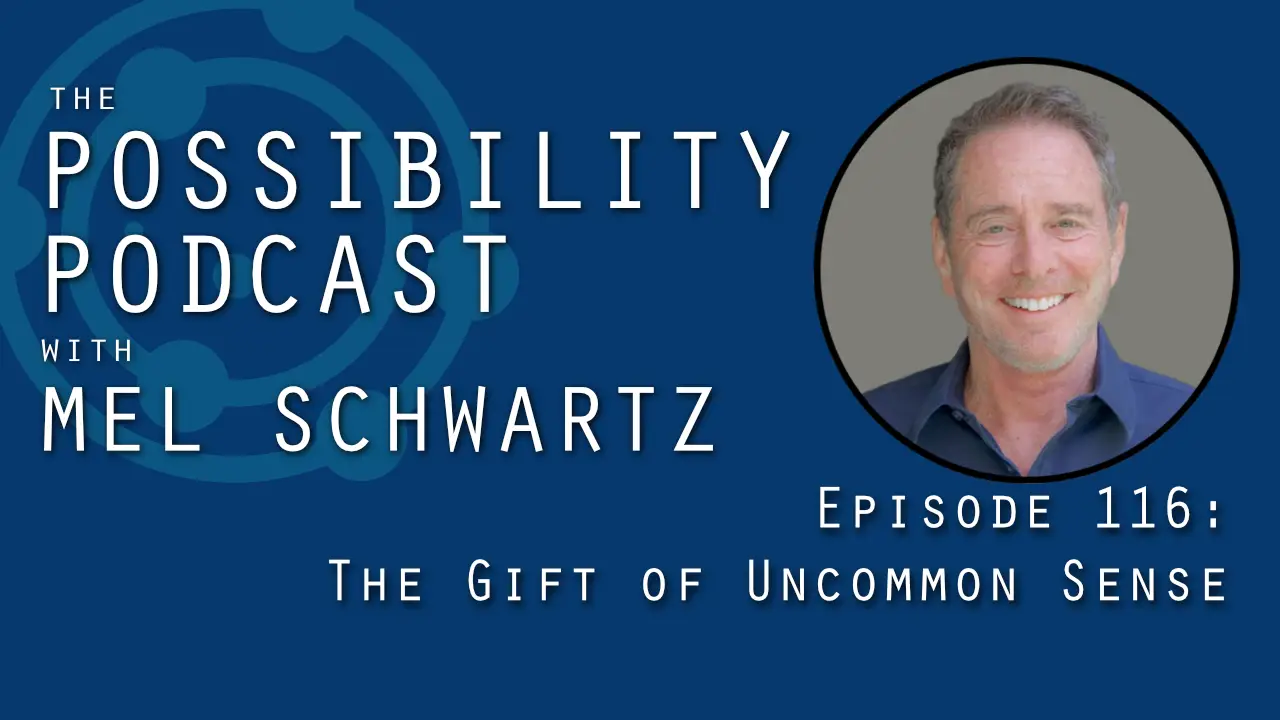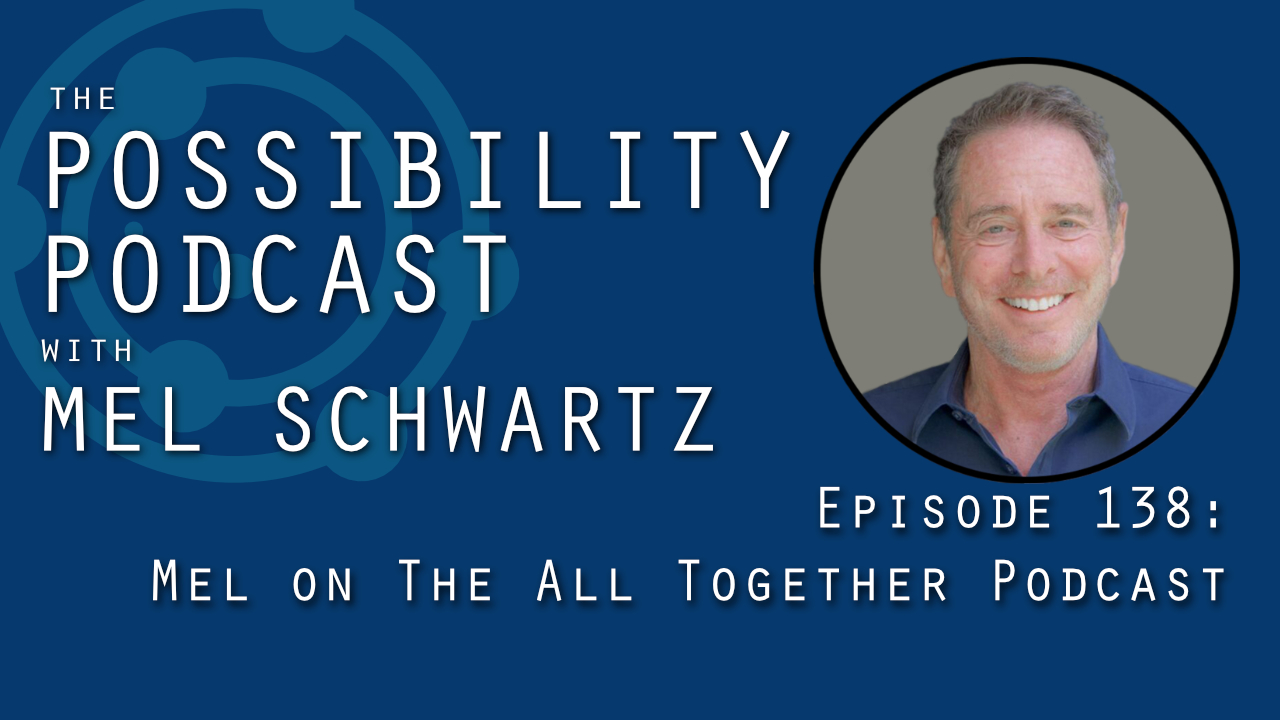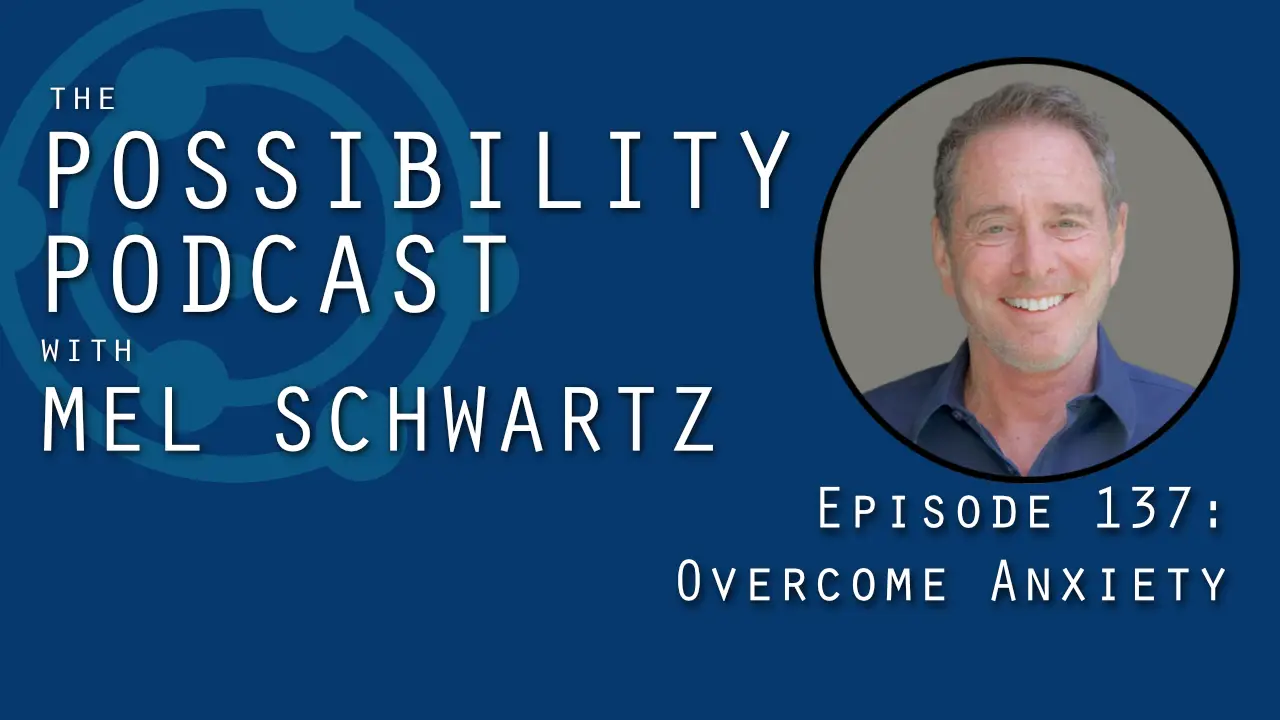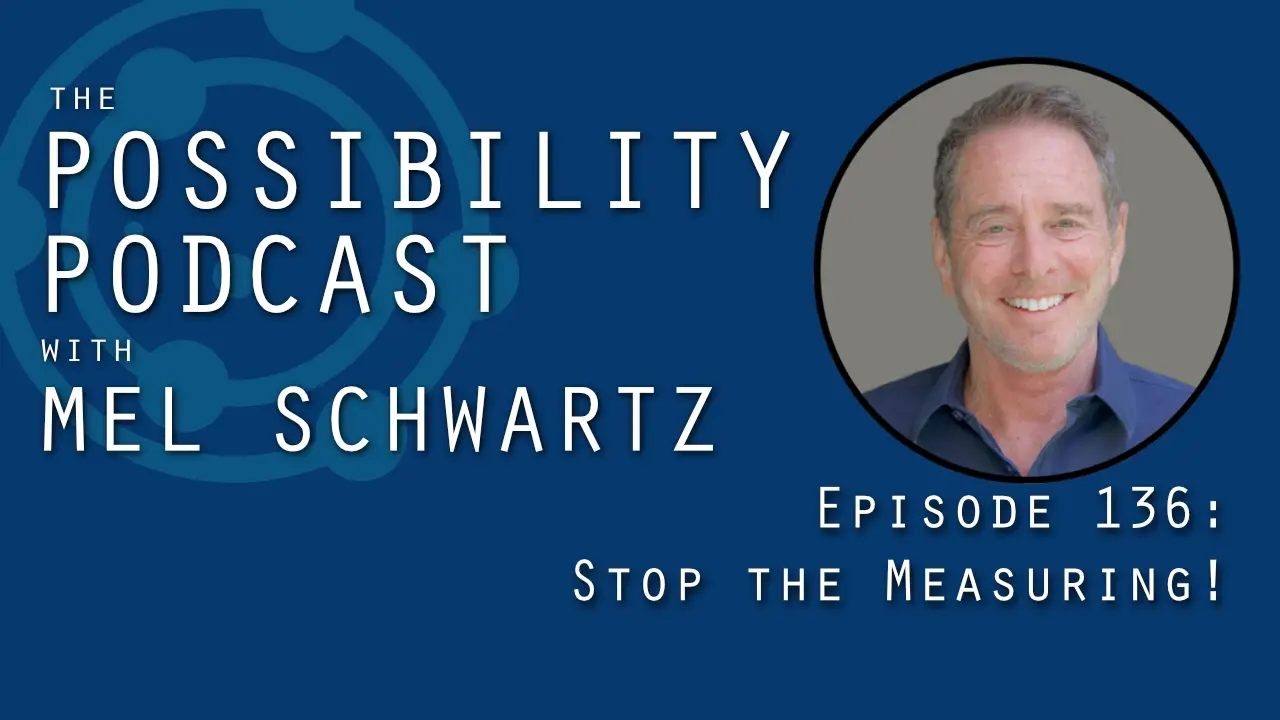Podcast: Play in new window | Download
Episode 116 of The Possibility Podcast with Mel Schwartz continues my exploration of the themes and principles of my next book, Uncommon Sense: How to Live a Fearless Life.
Often, we’re inclined to think our lives are difficult because that’s just what it means to be human. This perhaps fatalistic assumption is rooted in the fact that we’ve accepted certain assumptions, a certain philosophy we’ve received from our parents, our peers, our educational system…
Interested in bespoke marriage and relationship counseling from Mel Schwartz? Reach out!
…but what if that’s not the only choice?
What if we rejected so-called “common” sense and opted for a worldview that lifts us up rather than brings us down? An “uncommon sense” that emphasizes our limitless potential and doesn’t encourage adherence to the status quo?
Listen to this episode and discover how to depersonalize our struggles and harness life-affirming uncommon sense.
Once you’ve listened, let me know what you think! Be sure to leave a comment!
Subscribe to The Possibility Podcast with Mel Schwartz
Don’t miss a single Possibility Podcast with Mel Schwartz! Subscribe for free in iTunes / Apple Podcasts, YouTube, Spotify, RadioPublic, or wherever you listen to podcasts. Or, simply copy / paste the RSS link directly into the podcast app of your choice!
Please Rate and Review
If you enjoy The Possibility Podcast with Mel Schwartz, please take a moment to rate and review the show in iTunes / Apple Podcasts or Podchaser. It only takes a few minutes, and adding your review is as easy as clicking this link.
Your rating and review helps raise the visibility of The Possibility Podcast with Mel Schwartz, especially on iTunes / Apple Podcasts, which is one of the biggest podcasting platforms today. More visibility for the show means more listeners… and that growth means the show reaches — and helps — more people like you.
Thank you!
Talk With Mel!
Help others when Mel helps you: Contact Mel and find out how you can be a caller on the show and ask Mel a question. He’ll put the Possibility Principle to work for you, and your conversation will be recorded for use in a future episode of the podcast so other listeners can benefit.
Transcript of The Possibility Podcast with Mel Schwartz #116
Hello everybody and welcome to The Possibility Podcast. I’m your host, Mel Schwartz. I practice psychotherapy, marriage counseling, and I am the author of the book, The Possibility Principle, the companion to this podcast. I hope to be your thought provocateur and I’ll be introducing you to new ways of thinking and a new game plan for life.
Hello everyone. Last week, I shared with you some initial thoughts and a bit of a preface to my new work, a forthcoming book, still way down the road. It’s called Uncommon Sense. As promised, I’m going to now move a little more deeply into the premise of Uncommon Sense. So let’s begin.
Do you ever feel like life is really challenging? More importantly, do you ever wonder why it’s so challenging? You know, if you haven’t, if you haven’t thought that and felt that, you’re pretty much in the minority. So I want you to depersonalize your struggles. And in fact, you can ponder a different question.
Do you think your challenges, your struggles, do you think they’re simply human nature? Is life just intrinsically so difficult? There’s something else at play. I’ve come to believe, strongly believe it’s the latter. Life shouldn’t be so intrinsically difficult. I think the reason we have these challenges is we’ve been playing from an incoherent, insane game plan for life. You know what we call common sense, our underlying philosophy for how we do life, this lies at the heart of our struggles and it derails our ability to really thrive. To truly reach our human potential, what should be our human nature, we’ve got to operate from a life philosophy that supports us, not derails us. Most people ascribe to and follow the guidelines of what we call common sense without giving it any thought at all.
But what if common sense turned out to be misinformed, even nonsensical? I’m not talking about expressions like look both ways before you cross the street, but the larger operating rules of life that guide us and shape how we live, what we believe, what we think, how we interact and how we communicate. We pay so little attention to these large meta beliefs that script our lives, but they have an unimaginable impact on us. I’m speaking about commonly accepted beliefs like be careful not to make a mistake or change his heart, don’t show weakness or always do your best. These beliefs demonstrate the explicit operating rule book for how we engage life. And I believe that following the path of these unexamined common sense beliefs lies at the heart of our struggle with happiness, self-worth, results in fear, relationship conflict, and so much more.
If we follow these unwritten tenets, the golden rule book of life, you’d suppose that life should be going reasonably well. But is it? We tend to fall short or very far short, don’t we? With few exceptions, we struggle with unrelenting challenges, anxiety, depression, conflicted relationship, doubt, insecurities, anger, frustration, and existential struggle. All of that besets most of us. When your personal experiences don’t match up with your hopes and expectations, you think we should go back to the proverbial drawing board and rethink our game plan, but we don’t. Instead, we personalize our disappointments and upsets, and we think there’s something wrong with us. Or we continue to walk into the same wall, feeling frustrated, sometimes depressed. From this experience, we wrongly conclude that change is hard, but we rarely ask the questions about these guidelines which make us indentured servants.
So who wrote this rule book of commonly accepted wisdom that we blindly accept? Silly question, rhetorical question. I can’t answer it, neither can you. These beliefs and adages are just ingrained memes from unknown sources. You know when someone says, everyone knows you should say this or do that, or somebody says, they say, dot, dot, dot. Those are examples of unexamined common sense about how you ought to conduct your life. But do you ever ask yourself, who are they? Our culture at large, our parents, our families, our friends, all echo similar messages. What we refer to as common sense may be nothing more than believing what we’ve always believed and doing what we always do.
Common sense themes become indomitable. We cling to them fervently, and that’s why we get stuck. We conform to the very system that fails us. And this creates a program conformity, a consensual reality. This absence of self-reliance, which you’ve heard me speak about a lot, it blocks us from our authentic, resilient well-being. Sometimes people ask, what’s the right thing to do? They struggle making challenging decisions. In these cases, we surrender to what we think the anonymous, monolithic opinion of other people on what they would do. Defaulting to what we think they would suggest we should do means we haven’t developed our own inner wisdom.
And why would we assume that these others, they, are any wiser than we are? Or that there is a universal right thing to do or say? Reality snuffs out developing self-reliance.
Now here’s the key. In science, in business, and elsewhere in life, we test our theories and we evaluate the outcomes. And the results should either affirm or disprove our operating assumption. That’s how knowledge progresses. We discard what doesn’t work, and we invite in new thinking and add new methods. This enables businesses to increase profits, technology to advance, medical knowledge evolves, athletes improve their performance, and science surges forward. That type of progress requires critical thinking.
Now the way that I’m applying this term critical thinking simply refers to your capacity to look at your beliefs and actions and ask, how did I come to this belief? Why do I think this belief or action is sensible? How’s it working out for me? Why am I doing this and not that? Ask yourself, have you reflected on those questions? And if you shrug your shoulders and say, I never thought about it, there’s no critical thinking. And that is a common denominator in most of our lives. It’s kind of like a blind apathy that leads us to stumble from today into all of our tomorrows. And so life goes by.
Critical thinking requires contrasting our beliefs with our lived experiences. Think about how you think you want to live your life and how you are living your life.
I’d love to show you my appreciation for your subscribing to and rating this podcast by offering you a gift to one of the following. The Power of Mind, a live talk that I gave, or one of my digital eBooks, Creating Authentic Self-Esteem, Overcoming Anxiety, or Raising Resilient Children, and lastly, Cultivating Resilient Relationships. Once you have subscribed, please send an email to mel at melschwartz.com and just let me know which gift you’d prefer. Thanks.
When the evidence and your beliefs are at odds, we have to embrace the dissonance and shift our beliefs. Beliefs are simply biases and they shape our thoughts, our feelings, and our life experiences. At times, our beliefs are simply a dulled, unthinking mirror of our early life experiences. But on a deeper level, our beliefs and our common sense are informed by a prevalent philosophy. When I speak of philosophy, I’m referring to the underlying belief system that holds sway over our truths. And picture the word truths in quotes. It’s subjective, not objective. Much of the Western world is influenced by a philosophy of competing, winning, consuming, and a toxic individualism. And these themes strangle us with fear. And that in turn shapes and directs our common sense beliefs. Fear is a pervasive and dominating force in our existing common sense life philosophy. And a life that is predicated on fear cannot work out well. Fear precludes love, joy, and happiness. Now certain aspects of our lives like health, longevity, material comfort, financial security may be improving. But our happiness, fulfillment, and gratification, they tend to lag. Our personal intimate experience of life hasn’t kept pace with the remarkable advances we’ve made in our material and technological world.
If we applied the same scrutiny to our blueprint for life as we do these other matters, we’d really be evolving to a greater wisdom instead of floundering. Here’s an example of what I’m speaking about. What often begins as romantic relationships, they tend to devolve toward conflict or at least disappointment over time. We don’t question the unwritten rules of relationship that disrupt our harmony. We fall in love, maybe get married or partner, exchange vows, but only a small minority of relationships thrive for very long. The fact that half of marriages end in divorce, that is not the problem. The real issue is in intact marriages or committed relationships become discontent over time. Only a small percentage of committed relationships endure happily. That is a staggering rate of failure. If marriage were a corporation, it would be bankrupt. But when a business falls for bankruptcy, it needs to reorganize and develop a new business plan if it hopes to secure a second chance.
But do we stop and consider what needs to change for our relationships to thrive? Unfortunately the common sense path that guides us in relationship fails us way too often. We then wrongly conclude that relationships are hard and they are. If we go after them without insight or awareness, don’t you think it’s time to rethink our relationship and our communication rule book?
Here’s another example. According to the CDC, your likelihood of suffering with a mental illness at some point in your life is about 50%. That’s a staggering and bizarre rate of failure. Do you think it has something to do with living life from an incoherent, fearful and unsustainable way rather than your own personal dysfunction? But we have ignored ourselves to thinking of these dysfunctions as normal. If these emotional and psychological disorders are so prevalent and we acclimate to it, what does this suggest about how we’re living? Anxiety and depression don’t come to us as an infectious disease. We don’t catch them as we did COVID. This should be an alarm that signals that we are not living sensibly. You know, if a recipe results in a distasteful meal, you wouldn’t repeat the same recipe. Well, we need a new recipe for living.
Something appears terribly misguided in our plan for life when all of this disorder is our outcome. This should be screaming for our attention. Think about this. Do you feel genuinely happy, fulfilled and joyful? Do you feel sufficiently confident and self-assured? Or do you struggle with some aspect of self-esteem? Low self-esteem, as you’ve heard me say before, very curiously, is not a DSM diagnosis, but it underlies deeper emotional, psychological and relationship challenges. I will be sharing with you how common sense ironically contributes to low self-worth. Hear that again. Our common sense rule book contributes to low self-worth.
The expression, how’s that working out? When applied to this application of common sense, should cause us to stop and rethink how we are engaging life. So what would I propose as some solutions? Well, imagine if our educational curricula focused not only on academics, but on emotional intelligence and relationship skills, on how to develop authentic self-esteem and master your communication skills and how to ride the waves of change. What if you learn not to medicate or manage emotional and psychological troubles, but to actually transcend them? If we only appreciated the hard skills we learn in school or after math, reading, science, they are not more, but perhaps ironically less critical than learning human-based competencies. We only address our inadequacies when we derail.
But our education and our upbringing never provided the rails to begin with. So of course we derail. But what we need is this shift of mind so we can experience our lives differently. And we were never taught these valuable life enhancing skills and so we may stumble through life illiterate on what’s required to truly prosper. Again, you may have succeeded in educational, financial, material aspirations, but I bet you struggled to thrive in some actual experience of life. Success in and of itself does not ensure harmony or wisdom. In fact, there are times when there may be an inverse correlation.
Okay, so I’ve looked at all of these common sense strategies and I have found many of them to be utterly ridiculous. Not only do they not work for the most part, they actually wreak damage. We need a new philosophy for living, a new guidebook that opens our minds and our hearts to love and compassion, to authentic self-worth, and to thriving relationships. Now the word that summarizes this goal, the important ingredient, is authenticity.
Ask yourself, do you personally know anyone that you’d say is truly authentic? Authenticity is a rare commodity. It means that you wear no masks. You’re not worried about what other people think of you, but you remain caring and sensitive at the same time. And authenticity can only flourish in the absence of fear. But fear permeates the fiber of our lives. And fear seems to be the common underpinning of our existence. You know, we’re urged to be present and live in the moment, be in flow. But common sense rules tell you to do the opposite. Those rules are be wary of making a change, be afraid of making a mistake, worry about what others think of you. You see the wall you walk into there? Common sense counterintuitively freezes us in fear. And fear is the primary component of common sense.
So that is what has prompted me to write this book, which I’m just beginning, which I’m calling Uncommon Sense. Uncommon sense requires stripping off many of our personal operating beliefs. These new beliefs become the foundation for love, connection, meaning and purpose. Again, how did I come to write this book or to speak on these matters? Well, as you may know by now, I question things. I look at deeply accepted beliefs, actions, behaviors, and I ask, why do we think and believe and act the way we do? And from that perspective, I’ve been fortunate to view life from a different perch, a different angle, which has allowed me to source some insights.
I’m going to be introducing a fundamental rethinking of our operating beliefs and introducing what I call an emerging worldview, a new philosophy for living. This new way of contemplating reality invites us into innovative critical thinking, a gateway for better living. This is what I referred to earlier as the adaptive process of critical thinking that we apply to technology, science, business. Now we’ll apply that critical thinking to the underlying principles of how we do life. These new principles that I’ll be sharing with you offer an urgently needed rethinking of reality, universal reality and personal reality.
In coming weeks, I will be introducing some of the principles of Uncommon Sense. I hope you enjoyed today’s episode. I hope it gave you cause for reflection, contemplation, and an opening to the embracing of uncertainty and asking what if in the positive way, full of wonder, not of fear. Until next time, be well. Bye for now.
I hope you enjoyed this episode of The Possibility Podcast. I welcome your feedback on this and any episode. Please send me an email at mel@melschwartz.com or leave a comment in the show notes for this episode at melschwartz.com. If you like what you’re hearing, please take a moment to rate and review the show at Apple Podcasts, Spotify, or wherever you get your podcasts. Your reviews really help boost the visibility for the show, and it’s a great way for you to show your support. Finally, please make sure to subscribe to the Possibility Podcast wherever you listen to podcasts, and that way you’ll never miss an episode. Thanks again, and please remember to always welcome uncertainty into your life and embrace new possibilities.




